- Home
- Nnedi Okorafor
Binti, The Complete Trilogy: Binti ; Home ; The Night Masquerade Page 14
Binti, The Complete Trilogy: Binti ; Home ; The Night Masquerade Read online
Page 14
“When I see this god body, my people will know.”
I’d once asked Okwu about its planet Omuriro and it had said little. It told me there was no water on Omuriro, but everything was soft, fleshy, and connected. “You can’t breathe there without a mask, but you would be adored,” Okwu had said. The Meduse worshipped water as a god, for they believed they came from it. This was the root of the war between the Meduse and the Khoush, though the details had long been blasted away by violence and death, and then angry, most likely incorrect, tales of heroism or cowardice depending on the teller.
I briefly wondered what would happen if Okwu swam in the lake, since it’d never been in a body of water. But I didn’t ask.
The Root
My family’s house has been called “the Root” for over a hundred and fifty years. It’s been in our family for longer than the existence of its name. One of the first homes built in the Himba village of Osemba, the Root was made entirely of stone. Even the bioluminescent plants growing on the outside walls and the roof were generations old. The house was passed down through the women, and my mother—being the oldest daughter in her family and the only one born with the gift of mathematical sight—had been the clear inheritor of it when her mother passed.
A huge edifice built in an upward spiral shape stemming from the enormous meeting room on the bottom floor, the Root also had a spacious kitchen, seven bathrooms, and nine bedrooms. As everything was in Himbaland, the Root was solar powered, its grids so well embedded into the sides and roof of the house that their bases had melted and blended with the stone. The Root was old and more like a self-sustaining creature than a house. My father often joked that one day it would sprout a new bedroom next to mine.
The meeting room was open to all extended family members and close friends whenever they needed it, be it day or night. In this way, home was never a quiet place or a private one. There were no locks on any of the doors, not even in the bathrooms, and mealtimes were always grand occasions. So in many ways, the evening of my homecoming was no different from any other. However, in other ways, it certainly was.
Okwu’s arrival in Osemba wasn’t as spectacular (or terrifying) as its arrival at the launch port. A modest group of people were there to welcome us and gawk at Okwu, but most would arrive later in the evening. My family arrived in the shuttle behind us and most of them quickly headed home to get ready for the dinner that night.
“Okwu,” my father said in Himba, stepping up to us. He was shakily grinning as he looked up at it. “Welcome, to our village.” Okwu just floated there and my father glanced at me, his smile faltering. I motioned for him to keep talking. “Okay, heh, I am amazed by how you stood up to the Khoush. They don’t treat us Himba very well, either. But we are a quiet people, so . . . we tolerate it and work with them. Come see what I’ve made for you.”
We followed my father around the house. I let my sandals dig into the warm red dirt as I walked. It was so so good to be home.
“Oh,” my father peeped, turning to walk backward as Okwu and I followed. “I really enjoy the way you speak our language. Did my daughter teach you?”
“Yes,” Okwu said. “She is a good teacher.”
“She’s a true master harmonizer,” my father said, turning around.
I bit my lip and said nothing.
When we rounded the corner into the back, I was glad to have something to change the subject. “You can credit me for this,” my father said, turning to us with his arms out. Okwu thrummed with pleasure from deep in its dome.
“Oh, Papa,” I said, laughing. “This is amazing.”
Okwu moved past him to the large transparent tent. It touched the flap and a doorway sized just larger than Okwu’s body opened, lavender gas billowing out. Okwu floated inside, the flap closing behind it.
“I’m a master harmonizer too,” Papa said, looking at me and winking. “And a good researcher. Once I knew the components, it was easy to build a machine that creates their breathing gas. It’s similar to the gas produced in some of the spouts near the Khoushland volcanoes.”
“This was all your idea?” I asked, grinning.
“Of course,” he said. “The enemy of my enemy is my friend . . . even if it’s a monster.”
“Okwu isn’t a monster, Papa.”
“It nearly killed you on that ship and it nearly killed us all at the launch port.” When I opened my mouth to protest, he held up a hand. “It’s the job of the master harmonizer to make peace and friendship, to harmonize. For you to befriend that thing, you’ve done well.”
I gave him a tight hug. “Thank you.”
Okwu didn’t come out, except to thank my father and say, “I am very comfortable in here. You are Binti’s father.”
* * *
My bedroom was the same as when I’d left it. My table was messy with astrolabe parts, bits of wire, and sandstone dust; my closet was closed and my bed was made. There was a package on my bed wrapped in thin red cloth. I smiled. Only my mother would wrap a gift with such care, and always with red cloth. I turned it over, rubbing a hand across the smooth coolness of it, and set it back on my bed. I’d open it later, when things were quiet.
I went to my travel pod and brought out the dress I’d bought in Oomza Uni on a rare occasion where I’d gone shopping. Long and flowing, its design was vaguely Khoush, but mostly something else, and it was sky blue, a color Himba rarely wore. I put it on. When I came downstairs to join everyone in the meeting room, I immediately regretted wearing it. Stupid stupid, stupid, I thought, looking around. I’ve been away too long. Feeling the burn of everyone’s stares, I made a beeline for my mother, who’d just gone into the kitchen.
Two of my mother’s older sisters stood over a huge pot full of boiling rice and another bubbling with bright yellow curried goat stew. My mother lifted the heavy lid of a pot full of red stew so she could dump in a large plate of roasted chicken wings. My stomach grumbled at the sight of it all. With all the delicious exotic foods I’d eaten and prepared in my dorm kitchen on Oomza Uni, nothing compared to a simple plate of spiced rice and spicy red stew with chicken.
“Mama,” I said, keeping my voice down so my aunties wouldn’t hear. “When do this season’s group of women leave for pilgrimage? I couldn’t calculate the time or access news of the leaves from off planet.” I chuckled nervously looking at my mother, whose eyebrows raised. The pilgrimage time was calculated through numbers based on the current composition of local clay and written on three large palm tree leaves. These leaves were passed from home to home over a month until all Himba knew.
“You want to go on your pilgrimage?” my mother asked.
I nodded. “I want to see everyone, of course, but this is why I came home, too.”
My mother and I said it simultaneously, “It’s time.” Then we both nodded. She reached out and carefully touched my okuoko. She took one in her hand and squeezed it. I winced.
“So they aren’t hair anymore,” she said.
“No.”
I glanced at my aunties’ turned backs. I knew they were listening, as they stirred what was in the pots.
“It did this to you?”
“They,” I said. “Not Okwu . . . I don’t think.” I paused, remembering the moment when the stinger was plunged into my back as I knelt before the Meduse chief trying to save my life, those Meduse and the lives of so many others on Oomza Uni. “Really, I don’t know if it was Okwu; I didn’t see.”
“They’re a hive mind,” she said. “So it doesn’t matter.” She was rubbing the otjize off to reveal the true transparent blue of them with darker blue dots on the tips. I held my breath, as she inspected me with a mother’s eye and hand. She whispered softly and I held still. My mother only used her mathematical sight to protect the family. Now she used it to look into me. Deep.
She’ll see everything, I thought. Seconds passed, her hand grasping my okuoko,
her eyes boring into me, her lips whispering simple, but intuitively smooth equations that slipped away from my ears like oil from soap. I shifted from one foot to the other and prayed to the Seven that she wouldn’t start calling on Them to “come exorcise her polluted daughter” like some distraught mother in the overly dramatic newsfeed shows my sisters enjoyed watching. Suddenly, my mother let go of my okuoko and looked at me with clear eyes. Blinking. She lifted my chin. “The women leave tomorrow.”
My eyes grew wide. “Oh no! But . . . but I just got here!”
“Yes. For such a gifted harmonizer, your timing has always been awful.”
“My pilgrimage dress. Is that what’s in this package?” I asked.
She nodded.
“You knew.”
“You’re my daughter,” my mother said. When she pulled me to her and hugged me tightly, I rested my head on her chest and sighed. “Even if you’re wearing these strange blue clothes that make you look like some sort of masquerade.”
I burst out laughing.
* * *
All nine of my siblings came to my welcoming dinner, aunts, uncles, cousins, nieces, and nephews. Chief Kapika of the local Himba Council came too, as did his second-wife Neeka. Only my best friend Dele remained missing. He hadn’t been at the launch port, either. I was disappointed, but I would track him down early in the morning, before I left for my four-day pilgrimage.
“What kind of dress is that?” my sister Vera asked, as I stepped from the last stair into the crowded meeting room. “You look like some kind of mermaid masquerade. Maybe you should go greet Mami Wata at the lake.” She laughed at her own words.
I prickled. Vera was eleven years older than me, inches taller, and so beautiful that she’d had her pick of husbands from fifteen amazing suitors five years ago. She’d chosen a man who was handsome like a water spirit and an extremely successful astrolabe seller, to my father’s delight. Vera was also the most outspoken about my “irresponsibly selfish choice” to leave. She held her two-year-old son on her hip and he looked at me with wide eyes and a precious grin.
“Little Zu seems to like my dress,” I said.
“Zu likes anything strange,” she said, putting Zu down. He stepped up to me and grasped the bottom of my dress to look at it more closely. “I’m kidding,” Vera said. “Honestly, I expected you to come back wearing a skintight spacesuit or something. This isn’t so bad. And we’re all relieved that you made it home safely.”
She gave me a tight hug.
“Thanks,” I said.
And that was how the night began. As expected. I had a chance to catch up with several of my age mates, all of whom were proudly betrothed, boys and girls. I was relieved, though slightly bothered, that none of them asked if I were here to enter a betrothal too. Chief Kapika gave a speech about Himba pride. “And now our Binti Ekeopara Zuzu Dambu Kaipka of Osemba is back with us; now the community can contract back into itself like a self-protecting flower. We are all here. And that is good.” When he’d finished talking, everyone applauded. I’d smiled, uncomfortably. I was returning to Oomza Uni in two months for the beginning of next quarter, but I didn’t have to tell everyone this yet.
Eventually, we all sat down to eat and that’s when everything went wrong. I was enjoying a second helping of ostrich stew, my stomach stretched beyond its usual point. Back on Oomza Uni, Professor Okpala demanded that all her mathematics students control their daily intake of rich foods. To be full made treeing more difficult, she’d said. She was right. I’d never been one to eat more than what my body required, but I found my mind was sharper when I stayed just a little hungry with every meal. Over the months, I grew used to this not-quite-full sensation. However, today, I indulged.
I felt slow and heavy. And at the moment, to my delight, I was alone. The better to focus on my food. My father stood a few feet away with his two brothers, Uncle Gideon and Uncle Akpe, talking. One moment, Uncle Gideon was laughing raucously at something and then the next, he was struggling to keep my father from toppling over.
“Papa!” I shrieked, jumping up. It was as if my father’s fall created a vacuum, for everyone in the room rushed toward him. My brother Bena got to him before me, pushing me aside to do so.
My mother came running. “Moaoogo,” she shouted. “Moaoogo, what is the matter?”
Bena and my uncle held him up. “I’m fine,” my father insisted, but he was out of breath. “I’m fine.” Even as he spoke, he winced, limply holding his hands together. And it was then that I noticed the joints of his fingers were extremely swollen, almost bulbous. When had my father developed arthritis? I frowned as my sister Vera stepped up beside me on one side, her son clasping her skirts, and my oldest sister Omaihi on the other. I am not short, but all of my sisters, even my younger sister Peraa, who is two years my junior, were taller than me. Between Vera and Omaihi, I felt like a child standing between adult giants.
“Papa are you alright?” my sister Omaihi asked.
“Yes, yes, yes,” our father insisted, as his brothers helped him to sit down. My brother Bena joined Vera, Omaihi, and me, his arms across his chest and a frown on his face.
“Papa’s always overdoing it,” he said. “Stands all day in the shop working on the astrolabes and then comes to dinner and still doesn’t sit down.”
“Now you see, Binti,” Vera hissed.
I could feel them all glaring at me now. “How long has he been—”
“Since you left, really,” Vera said, looking squarely at me. Bena and Omaihi looked at me too.
“What?” I asked. “You think I caused it by leaving?”
Vera scoffed and only continued glaring at me.
I looked to Bena and Omaihi for support, but they said nothing.
“That’s so wrong,” I said.
“It’s the truth,” Vera said, her voice sharply rising. I looked around. She meant everyone to hear. “Binti, now that you’re here, I think you need some tough truth.”
“Before you have the nerve to disappear in the night again,” Omaihi firmly added.
“I . . . I didn’t leave at night, I left in the early morning,” I muttered. I took a deep breath, slipped my hand into my front pocket, and grasped my edan. It was mine, the object that I was studying at the university over a dozen planets away, a place my sisters, my family, had never set foot on.
Vera stepped closer, leaning in as she looked down her nose at me. Her otjize-covered locks nearly reached her knees and they made my okuoko look like buds to a tree full of blooming flowers. “See Papa! You were supposed to take over the shop, so he could sit down and be proud. We’re all very happy to see you, Binti. But you should be ashamed of yourself. Your selfishness nearly got you killed!” Now she was pointing her index finger in my face. I could hear my heart beating in my ears. “Then what would Papa do? And . . . and even if you die, the world will move on. Who are you? You’re not famous.”
I was squeezing my edan, but somehow, I stayed quiet. The entire room was quiet and listening. Where were my parents? There they were, yards away. My father was sitting now, my mother and uncles beside him. All were just looking at us.
“You’ll always be alone if you don’t stop this and come home,” my oldest sister added. Her voice wasn’t as loud as Vera’s, but it was much harder. “Jumping back and forth between planets, you have to slow down.”
A few people in the room grunted agreement.
“I’m doing what I believe the Seven created me to do!” I said. But my voice was shrill and breathless. I was dizzy from the strain of controlling my outrage, needing to say my piece and feeling that shame that had resided deep within me since I’d left. “Do you even understand what I did on that ship? Everyone was dead, except the pilot and me! I saw them do it! I—”
“Then you befriended the enemy of humanity,” my brother Bena said from behind me.
I whirled around
and said, “No, the enemy of the Khoush people. You know, the people you’ve been railing against since you learned how to read?” I turned back to Vera, who grandly sucked her teeth, as she looked me up and down with disgust.
“You’re so ugly now, Binti,” she said. “You don’t even sound the same. You’re polluted. Almost eighteen years old. What man will marry you? What kind of children will you have now? Your friend Dele doesn’t even want to see you!”
That last part was like a snakebite.
“Maybe you shouldn’t have come back,” Vera growled, her face inches from mine. I could practically feel her keeping herself from punching me in the face. Do it, I told her with my eyes. I dare you. My cheeks were hot and my body had begun to tremble.
“Some of the girls here now want to do what you did,” she said. “You’re supposed to be a master harmonizer. Look at you. What harmony do you bring here?”
I tried to grab even the simplest equation, 1 + 1, 0 + 0, 5–2, 2 × 1. I tried to do what I did on that ship, when I held my own life in my hands, when I’d faced a race of people who detested all humans because of a few humans. But every number eluded my mental grasp. All I could see was my sister’s otjize-covered face with her long silver earrings that clicked to enunciate her words and her elaborate sandstone and gold marriage necklace that meant more to everyone here than my traveling to another planet to be a student at the greatest university in the galaxy.
She stepped even closer. “You bring dissonance! What if . . .”
“Enough!” I screamed at her, shaking with anger. “Who . . . who are you, Vera?” I couldn’t find any more words. Instead I inhaled sharply and then did something I’d never thought of doing, even when at my angriest. I spat in her face. It landed on her cheek. Immediately, I regretted my actions. However, instead of shutting up, I continued shouting, “Do you have any clue who I am?” Even as I carried the weight of my regret, it felt wonderful to roar like that at her, at everyone. I was about to say more when Vera shrieked, my saliva still glistening on her face. She scrambled back, falling over a chair. Her elbow knocked over a cup of water on a table, which rolled to the edge and shattered on the floor. I heard my father exclaim. Behind me, I heard Bena gasp and scamper away from me too.

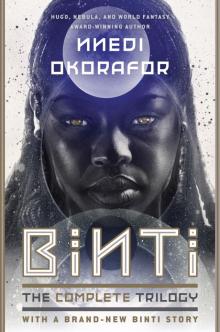 Binti, The Complete Trilogy: Binti ; Home ; The Night Masquerade
Binti, The Complete Trilogy: Binti ; Home ; The Night Masquerade Remote Control
Remote Control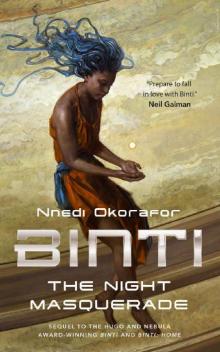 Binti: The Night Masquerade
Binti: The Night Masquerade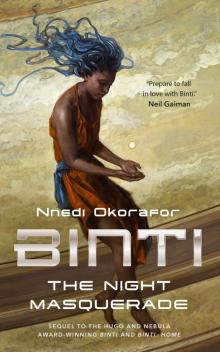 Binti--The Night Masquerade
Binti--The Night Masquerade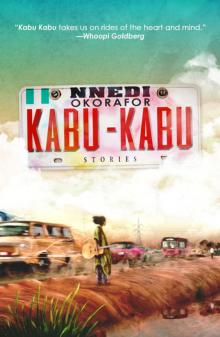 Kabu Kabu
Kabu Kabu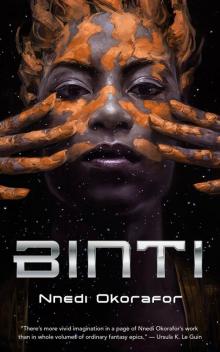 Binti
Binti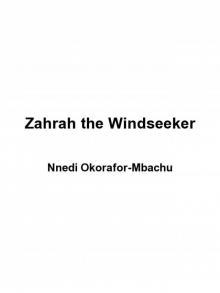 Zahrah the Windseeker
Zahrah the Windseeker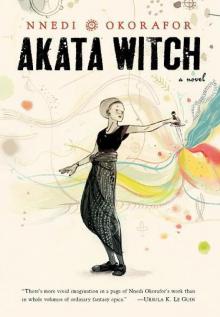 Akata Witch: A Novel
Akata Witch: A Novel Ikenga
Ikenga Who Fears Death
Who Fears Death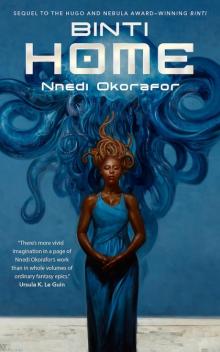 Binti--Home
Binti--Home Lagoon
Lagoon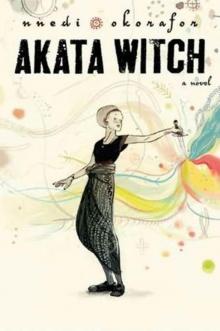 Akata Witch
Akata Witch The Book of Phoenix
The Book of Phoenix Akata Warrior
Akata Warrior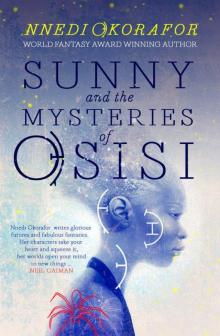 Sunny and the Mysteries of Osisi
Sunny and the Mysteries of Osisi